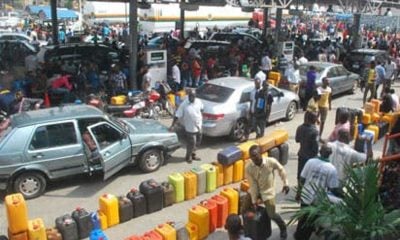The over two weeks long scarcity caused by the withdrawal of the methanol-blended Premium Motor Spirit, popularly called petrol, imported into Nigeria in January, persisted on Wednesday in Abuja and other states.
Amidst the scarcity, the Nigerian National Petroleum Company Limited on Wednesday released the details of how it distributed a total of 387.59 million litres of PMS in one week to bridge the petrol supply gap.
According to the NNPC in a statement, the petrol distributed to Nigerians through retail filling stations from February 14 to 20, 2022, represented an average daily distribution of 55.4 million litres.
A breakdown of the NNPC weekly national evacuation report released on Wednesday showed that 80 per cent of all the PMS took place at 20 high loading depots, while 20 per cent took place at the other loading depots.
The oil firm said the top 20 high loading depots used were Pinnacle-Lekki, which evacuated the highest volume of 70.8 million litres; NIPCO, 22.6 million litres; and AITEO, 22.3 million litres.
Others include Swift, 16 million litres; 11 Plc, 15.9 million litres; Bovas Bulk, 15 million litres; and Frado, 14.6 million litres.
The NNPC named other depots to include Keonamex, 13.7 million litres; MRS Ltd, 11.9 million litres; Rainoil, 11.6 million litres; AYM Shafa, 11.2 million litres; and TSL, 11.2 million litres.
It continued, Rainoil Lagos, 11.2 million litres; Matrix, 10 million litres; Conoil Lagos, 9.7 million litres; AA Rano, 8.8 million litres; Bluefin, 8.4 million litres; HOGL, 8.2 million litres; Ibafon Calabar, eight million litres; and Mainland, 7.5 million litres.
With the distribution of 385.59 million litres in one week, the scarcity of petrol was arrested mildly, but the queues in Abuja and neighbouring Nasarawa and Niger states were seen on Wednesday.
The two filling stations, Conoil and Total) in front of the NNPC headquarters in Abuja, for instance, had queues on Wednesday, as motorists still waited patiently to be served petrol.
The methanol-blended product, according to NNPC, was imported into the country by four oil marketers through four PMs cargoes under NNPC’s Direct Sale Direct Purchase arrangement.
The four companies that supplied the methanol-blended petrol, as contained in the NNPC’s statement, include MRS, which made the importation through a vessel named MT Bow Pioneer.
Others include Emadeb/Hyde/AY Maikifi/Brittania-U Consortium through a vessel identified as MT Tom Hilde; Oando through a vessel named MT Elka Apollon; and Duke Oil.
Emadeb, Oando, Brittania-U and MRS had since denied the allegation against them by the NNPC.
In the midst of the crisis, NNPC promised that over 2.3 billion litres of PMS would be delivered before the end of February 2022 to totally arrest the situation.
Oando, Duke Oil insist NNPC approved imported dirty fuel, Reps deepen probe
Meanwhile, the House of Representatives Committee on Petroleum Resources (Downstream), on Wednesday, continued with its investigation of the importation of adulterated petrol into Nigeria.
The committee grilled the remaining two of the four contractors engaged by the NNPC to supply the fuel.
Two of the suppliers, Oando and Duke Oil, while appearing before the committee at its investigative hearing in Abuja, denied culpability in the matter.
Emadeb/Hyde/AY Maikifi/Brittania-U Consortium and MRS Holdings had earlier appeared before the panel on Tuesday to also deny responsibility for the importation of the contaminated fuel.
The committee had last week grilled the Group Managing Director of the NNPC, Melee Kyari; and the Chief Executive Officer, Nigerian Midstream and Downstream Petroleum Regulatory Authority, Farouk Ahmed, over the matter.
On Wednesday, the leader of the Oando team, Afanga Afanga, said the cargo supplied by the oil firm was tested and certified okay by the NNPC.
Afanga said, “It is important to note that this PMS cargo that was supplied met and was in line with all the Nigerian and the DSDP contractual specifications. This was confirmed by the mandatory tests that were conducted at the loading port in Europe and before discharge in Nigeria by an independent NNPC quality inspector and finally by agents of the Nigerian Midstream and Downstream Regulatory Authority.
The Chairman of the committee, Abdullahi Gaya, while reacting, said, “We have not digested the documents but based on the summary you have given, I will allow members to ask questions. Then, in due course, we are going to invite you again to come and explain if there is a need for that, based on the documents that you brought.”
Also, the Managing Director, Duke Oil, Lawal Sade, said based on its subsisting contract with the NNPC, the engaged one of its registered counterpart and supplier, Sahara Energy Resources, and it was assigned a back-to-back contract for the supply of the Nigerian spec of PMS cargoes in an effort to fulfil the NNPC request.
Sade partly said, “Yes, there was a delivery of cargo by Duke Oil like you have seen in the report (submitted to the committee) and that cargo met up with the Nigerian spec, as it is both at the loading and discharge ports.
“There was a confirmation by the regulator, which is the new Nigerian Midstream and Downstream Regulatory Authority, to discharge that cargo within the stipulated date. The cargo was discharged and the vessel sailed.
In his submission, Gaya said, “We will go through the documents and if there is a need to call you, we will do that.”

